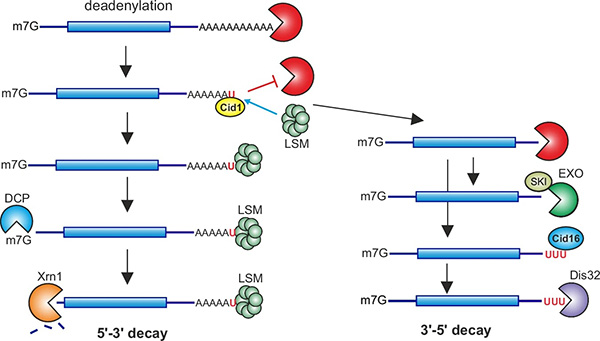Distinction from the Committee of Cell Molecular Biology PAS for researchers from the Faculty of Biology UW

16 09 2025
We are pleased to announce that a publication by a team of researchers from the Institute of Genetics and Biotechnology, Faculty of Biology, University of Warsaw, has been distinguished by the Committee of Cell Molecular Biology PAS in the Prof. W. Krzyżosiak competition for the best nucleic acid research carried out in a Polish laboratory.
The article entitled “Uridylation regulates mRNA decay directionality in fission yeast” was published in the prestigious journal Nature Communications. Its authors are Dr. Maciej Grochowski, Dr. Eng. Lidia Lipińska-Zubrycka, Dr. Anna Golisz-Mocydlarz, Dr. Monika Zakrzewska-Płaczek, Borna Jurković, and Dr. habil. Michał Małecki, in collaboration with researchers from the Polish Academy of Sciences and the Francis Crick Institute in London.
The distinguished publication focuses on the mechanisms of messenger RNA (mRNA) degradation – a key process regulating the amount of proteins in the cell. The stability of mRNA in the cytoplasm depends on the protection of its ends – the “cap” at the 5’ end and the poly(A) tail at the 3’ end. The classical model assumes that mRNA degradation proceeds mainly in one direction – from the 5’ end after prior shortening of the poly(A) tail.
In this study, the researchers showed that an additional modification of the 3’ poly(A) tail by adding one or several uridine residues helps redirect degradation towards the opposite end of mRNA (the 5’ end). These findings were made possible thanks to the development of a new technique that allows for genome-wide analysis of uridylation. The research was conducted using the model organism Schizosaccharomyces pombe. Uridylation is widespread in most studied eukaryotic organisms, and the authors propose that it plays a similar role in cytoplasmic mRNA degradation as observed in fission yeast.
More details:
https://kbmk.pan.pl/przyznano-nagrody-za-najlepsze-publikacje-w-2024r-z-obszaru-mikrobiologii-oraz-badan-nad-kwasami-nukleinowymi/
We warmly congratulate our researchers on this prestigious distinction and wish them further scientific success!